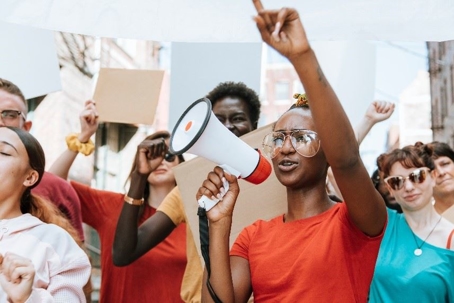Knowledge Is Power.
The month of June has been far from quiet. Following the unlawful murder of George Floyd on May 25, 2020, citizens across the US could not sit still. Breonna Taylor, Ahmad Arbery and Elijah McClain are a few of the numerous people who were killed by law enforcement for unlawful reasons. As a result, protests erupted across the nation in response to police brutality against people of color. Further, the Black Lives Matter movement has made national headlines and continues to do so during these uncertain times.
You may have seen protests on the news or participated in them yourself. Regardless of how you responded to the recent acts of police brutality, it’s important to recognize that protestors’ rights are being violated while they exercise their First Amendment rights. The First Amendment specifically protects free speech and peaceful assemblies, meaning if you were arrested for legally exercising this right, you must let us know so we can defend your rights.
Protestors’ Rights in the US
This is a vital time to learn about protestors’ rights, as described by the ACLU of Southern California:
- Free speech is permitted in “traditional public forums,” such as streets, sidewalks, and parks. You can typically exercise your First Amendment rights on other public property, like plazas in front of government buildings, as long as you are not blocking access to the building or interfering with other purposes the property was designed for.
- Private property owners can set rules for speech on their property. The government may not restrict your speech if it occurs on your property or with the consent of the property owner.
- You may distribute leaflets, flyers or other literature on your own property or on public sidewalks, parks and plazas
- Police must treat protesters and counter-protesters equally, as counter-protesters have rights as well; they should not be allowed to physically disrupt the event they are protesting, but they have the right to be present and voice their disagreement. Police are permitted to keep these groups separated but should allow them to be within sight and sound of one another.
- When you are lawfully present in any public space, you have the right to photograph anything in plain view, including federal buildings and the police. On private property, the property owner may enforce rules related to photography or video.
- You don’t need a permit to march in the streets or on sidewalks, as long as you don’t obstruct car or pedestrian traffic. If you don’t have a permit, police officers can ask you to move to the side of a street or sidewalk to let others pass or for safety reasons.
- A speaker can be arrested and convicted for incitement only if they advocate for illegal actions and if those illegalities are imminently likely to occur.
- You may picket or protest and chant or sing on public sidewalks, parks and plazas as long as you aren’t blocking sidewalks and building entrances.
If you were arrested for exercising your First Amendment rights lawfully, reach out to our defense lawyers at (805) 467-6060 immediately. No one, not even law officials, should get away with violating your protestor rights. As such, we want to help you get through this frightening time as smoothly as possible so you can move forward. We look forward to hearing from you.

